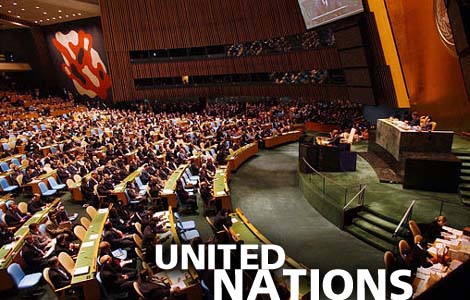Betancourt, other victims of terrorism share experiences at UN
 New York - High profile Colombian politician Ingrid Betancourt and scores of lesser known victims of terrorism on Tuesday appealed to the international community to focus on their unique needs and stop treating them as mere statistics.
New York - High profile Colombian politician Ingrid Betancourt and scores of lesser known victims of terrorism on Tuesday appealed to the international community to focus on their unique needs and stop treating them as mere statistics.
Victims of terrorist attacks in Nairobi, London, Baghdad, Amman and Colombia met at United Nations headquarters for the first UN symposium designed to give them a voice, and shared their experiences with decision-makers.
"I hope that the meeting gives an opportunity for change," said Betancourt, a one-time Colombian presidential candidate with French citizenship who was freed in July with
14 other hostages after six years of detention by FARC rebels in the Colombia jungle.
"We need a study of terrorist victims - to study the possibility for their protection and their families and to make their voices heard," she said. "It's my best hope."
Betancourt said she will work to secure the freedom of other people still held captive by terrorists.
UN Secretary General Ban Ki-moon, who presided over the symposium, said governments had been paying more attention to fighting terrorism than on helping victims and their families.
Laura Dolci's husband was among 21 other UN employees killed when a bomb ripped through the UN office in Baghdad in August 2003. Also killed in the attack was the head of the UN mission, Sergio Vieira de Mello of Brazil.
Dolci said she endured a "very lonely experience and a piece of horror" since her husband's death.
"We have come here to share the experience as we cannot live in isolation," she said. "We hope to influence policy makers to change their attitude and recognize our right to freedom, health, truth and justice."
"It's hoped that it (UN discussion) will alleviate the sufferings of the victims and their families," she said.
While Betancourt enjoyed a high-profile because of France's direct intervention in the campaign to free the hostages, other victims of terrorism are largely anonymous.
"We have heard the voices of terrorists, but seldom the voices of the victims," said Robert Orr, a UN assistant-secretary general in charge of the counter-terrorism implementation task force.
Orr said the symposium will help the world understand the complex situation of terrorist victims and design ways to meet their grievances.
"Victims still too often feel that their needs are either ignored or insufficiently heard or recognized," Orr said. "Governments feel the sting of criticism for doing too little and often react defensively. This dynamic must change."
The symposium can also build what the UN calls a "grand coalition against terrorism" based on decisions of the past years to fight terrorism from the point of view of the world organization. The UN General Assembly has adopted a dozen resolutions to fight terrorism, decisions that are not based on the military aspects of fighting terrorism.
The 192-nation assembly has tried for years, although unsuccessfully, to adopt an international convention against terrorism because governments could not agree on the definition of terrorism.
The UN symposium coincides with the observance on Thursday of the seventh anniversary of the September 11 terrorist attacks on New York, Washington and an airplane over Pennsylvania.
The UN did not draw a direct connection between the two events. (dpa)